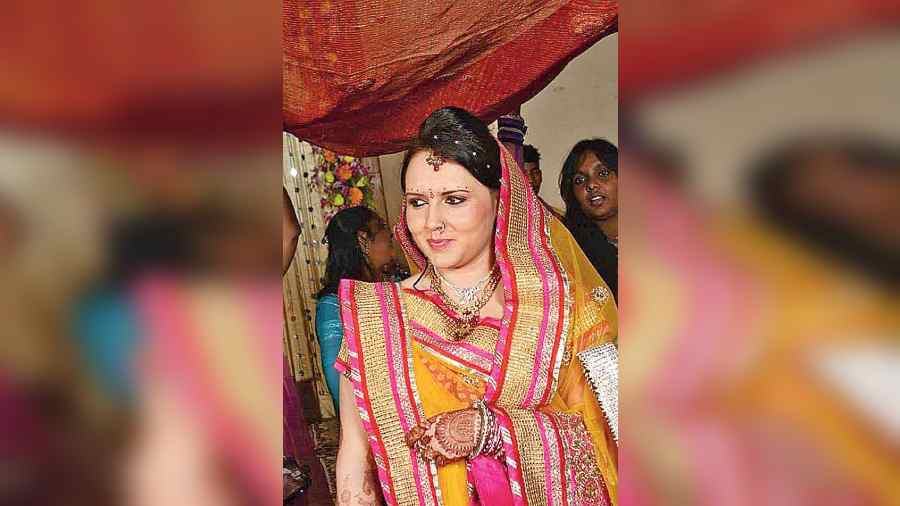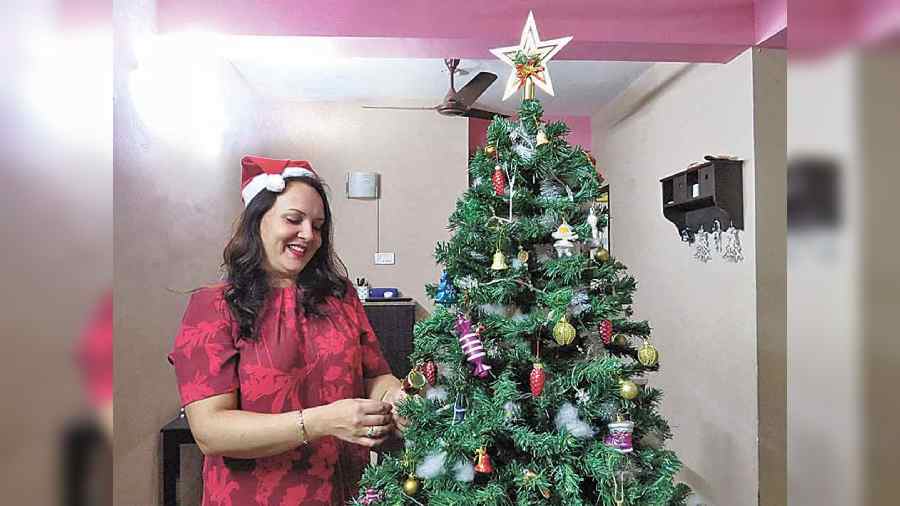Russians are famous for vodka,” Tatiana Bogdanova-Bajoria laughs as she offers coffee to The Telegraph at her Rajarhat home. “If there is no vodka at a wedding, they’d say: ‘What to celebrate?’ And if they find there’s no meat, they’d exclaim: ‘Oh my gaaaawd! What to enjoy here?’” she says, breaking into peals of laughter.
The irony is Tatiana, or Tanya as she is called here, has married into a strictly vegetarian conservative Marwari family [“Not even aanda (egg) cooked in their home!” she stresses.] And she had never been to Kolkata before her marriage!
It’s been eight years now and the resident of Green Vista on Rajarhat Main Road speaks Hindi confidently with a Russian accent.
Cross-continent courtship
She met Mayank Bajoria on the internet. “We were working for different branches of the same company, me in Moscow, he in Kolkata. We used to mail each other.”
In 2011, she had visited Goa, a favourite vacation spot with Russians, with her mother and a friend. “We were not close yet. But he came over for a few days. I had never seen or talked to an Indian face to face. I didn’t even speak much English.”
By the next year, Mayank was calling Tanya every day over Skype. Tanya says when the big question was popped, Mayank had warned her about the hurdles, including language. She started taking Hindi lessons at the Indian embassy in Moscow for a year. “In Russia, parents don’t interfere in children’s decisions. ‘Your choice, your mistakes,’ they say. He had more trouble at home. Bengalis, I have seen, are modern but Marwaris don’t marry outside community. And there I was, from a different planet!”
Mayank, she heard later, was known to be a shy boy. “‘Yet, he gave us such a — how to put it in a good way — surprise,’ many of his relatives told me later.”
After a month, when the family relented, there were daily video calls from her would-be mother-in-law. “It was a series of interviews. I’d be like: ‘Haan, haan, Mommyji.’ My Hindi wasn’t that good yet.
Wedding & in-laws
Six months later, in November 2013, she flew down to Kolkata with her mother to get married seven days later. “My mother is a fan of Shah Rukh Khan and she thought Mayank looked like an Indian actor and she was in a Bollywood wedding! It went on for five days!”

Tatiana dressed as a bride during her marriage in November 2013
Her surprise is understandable, given Russian weddings are done in day. “Morning court, evening banquet… ho gaya shaadi,” she says. Even church weddings, for the religious couples, do not happen before a year or two, or sometimes after 20 or 30 years. “In Russian Orthodox Church, once you marry there is no divorce. So people prefer to be sure (that the marriage would last).”
So the long-drawn wedding, with “kapda so heavy”, was overwhelming. But she loved how everyone helped in dressing her up in jewellery, bindi and even holding an umbrella overhead. “They make you feel special. But everyone was so busy they had no time to explain what was haldi or mehndi or why I needed to put all that on.”
Explanations dodged her even during her five years of stay with her in-laws. “Every day Laddugopal’s prasad lagata hai. I did not understand why a certain ritual needed to be done exactly that number of times and not more or less.” They now stay in a separate apartment in the same complex.
She is unwilling to dwell on the problems she faced. “Russian women are strong. They learnt to do everything when the men left for the war (World War II). Many did not return. Our mothers have taught us to survive in any condition — if you don’t like something, avoid it, listen less or try to understand,” adding that Indian girls too face post-marriage problems. “I am blessed to marry into a good Marwari family.”
She now has a six-year-old son, Adyann. “Mommyji named him Hanu, from Hanuman. He speaks four languages — Russian with me and his grandma, Hindi with my in-laws, English with his father and Bengali in the neighbourhood.”
Tanya now has a cousin, Alexandra, staying over, who has joined her husband’s company. She is also part of a network of Russian women in the city. “There are about 40 of us, some working, some homemakers. We meet at Gorky Sadan, cooking a Russian dish each. Our children read poems and chat in Russian. We go for picnics too.”
She can cook Indian dishes too. “When I get tired of Indian spices, I make myself Mushroom Blini (pancake) or Pirozhki (pie).”
Back in Moscow, the best tables are laid for the New Year’s Eve dinner. “Here I make Olivier Salad, with potato, meat, cucumber, green peas and mixed with mayonnaise…wah!” her eyes sparkle.
She already has a big Christmas tree lit up and decorated in her drawing room. “In Russia, we get real trees. Our Christmas is on January 7.” There are other differences in the Russian Orthodox Church. “We don’t have Santa Claus. We have Grandfather Frost or Ded Moroz and his granddaughter Snegurochka.”
There & here
The biggest difference with life in Moscow is lack of nature at the doorstep. “There are parks, lakes and pockets of forests inside Moscow. I can walk five kilometres without a car coming in my way. We used to swim in lakes after school. Here I step out of the complex (on Rajarhat Main Road) and there are cow, bike, cycle and rickshaw and bus! Paydal kahan jaaungi!”
She relishes visits to Eco Park. “This area is developing fast. So many malls and flyovers now.”
The one time of the year she has to be home is Victory Day on May 9. “We have parades at Red Square, fireworks light up the sky, WWII veterans get gifts and medals... I don’t feel that patriotic spirit here.” An only child, she missed meeting her mother last year and but visited her this May. “Like most Russians, she has a country house where we plant potato, cucumber, carrots... My son waters the plants when we go.”
She has turned entrepreneur, thanks to her training in homemade cosmetics. “I make natural soaps, creams and oils with shea butter, cocoa butter and argan oil. I have my Instagram page called Arganabar and participate in expos.”
She likes how friendly and helpful Calcuttans are. “The best thing here is the delivery service. If I can’t go to get cat food, the shop-owner will bring it to me by cycle. That is impossible in Moscow,” she says, picking up her jet black pet Pumi.
Christmas decor gets costlier, sale of large trees plunges in Salt Lake

Christmas decoration on sale at Baisakhi market on Wednesday. “Last year, despite the pandemic, these items sold more. This year everything cost double at Burrabazar from where we pick up our stock. The tree that I sold last year for Rs 1,500 is now priced Rs 3,000. So sale of large trees is down to a trickle. The only trees that are selling are the small ones costing Rs 150-175. Those are being picked up by students who are being given Christmas projects from their schools,” said Nitai Chandra Das, who mans the counter at Needs.
